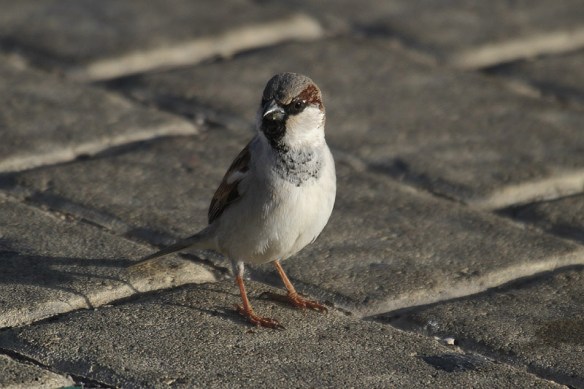 From Phys.org
From Phys.org
A new study has shown that, as is widely known to readers here, bird populations across Europe have experienced sharp declines over the past 30 years, with the  majority of losses from the most common species. However, what is less well known is that numbers of some less common birds have risen. The study, published in the journal Ecology Letters, reveals a decrease of 421 million individual birds over 30 years. Around 90% of these losses were from the 36 most common and widespread species, including house sparrow, skylark, grey partridge and starling, highlighting the need for greater efforts to halt the continent-wide declines of our most familiar countryside birds.
majority of losses from the most common species. However, what is less well known is that numbers of some less common birds have risen. The study, published in the journal Ecology Letters, reveals a decrease of 421 million individual birds over 30 years. Around 90% of these losses were from the 36 most common and widespread species, including house sparrow, skylark, grey partridge and starling, highlighting the need for greater efforts to halt the continent-wide declines of our most familiar countryside birds.
One of the study’s authors, Richard Inger from the University of Exeter, said: “It is very worrying that the most common species of bird are declining rapidly because it is this group of birds that people benefit from the most.”
 “It is becoming increasingly clear that interaction with the natural world and wildlife is central to human wellbeing and significant loss of common birds could be quite detrimental to human society.”
“It is becoming increasingly clear that interaction with the natural world and wildlife is central to human wellbeing and significant loss of common birds could be quite detrimental to human society.”
Birds provide multiple benefits to society. They help to control agricultural pests, are important dispersers of seeds, and scavenging species play a key role in the removal of carcasses from the environment. In addition, for many people birds are the primary way in which they interact with wildlife, through listening to bird song, enjoying the sight of birds in their local environment, feeding garden birds and through the hobby of bird watching.
The majority of the declines can be attributed to considerable losses from relatively few common birds, but not all common species are declining. Numbers of great tit, robin, blue tit and blackbird were all shown to be increasing. Populations of rarer species, including marsh harrier, raven, common buzzard and stone curlew have also shown increases in recent years: this is likely to be the result of direct conservation action and legal protection in Europe.
Head of Species Monitoring and Research at the RSPB’s Centre for Conservation Science Richard Gregory said: “The rarer birds in this study, whose populations are increasing, have benefited from protection across Europe. For example, white stork and marsh harrier receive among the highest level of protection in the EU – this is why their numbers have increased. The conservation and legal protection of all birds and their habitats in tandem are essential to reverse declines.
“This is a warning from birds throughout Europe. It is clear that the way we are managing the environment is unsustainable for many of our most familiar species.”
Conservation efforts tend to be focused on rarer species but the research suggests that conservationists should also address issues affecting common birds, for example those traditionally associated with farmland. The decline in bird populations can be linked to modern farming methods, deterioration of the quality of the environment and habitat fragmentation, although the relative importance of these pressures remains unclear.
 This pattern has been highlighted in Jersey where the very high profile gains like the newly arrived marsh harrier, common buzzard and little egret, and returning species like peregrine and sparrowhawk, are offset by the losses like yellowhammer, reed bunting and cuckoo and declines in many others including stonechat, linnet and skylark.
This pattern has been highlighted in Jersey where the very high profile gains like the newly arrived marsh harrier, common buzzard and little egret, and returning species like peregrine and sparrowhawk, are offset by the losses like yellowhammer, reed bunting and cuckoo and declines in many others including stonechat, linnet and skylark.
The study brought together data on 144 species of European bird from many thousands of individual surveys in 25 different countries, highlighting the value of the different national monitoring schemes increasingly working together. The researchers suggest that greater conservation funding and effort should be directed to wider scale environmental improvement programmes. These could include urban green space projects, and effective agri-environment schemes, which, informed by lessons learned from past schemes, should aim to deliver real outcomes for declining bird species whether they are rare or common.
Read the paper’s abstract here





What a useful and excellent source of chough (and other) news ! Congratulations to all of the magnificent Durrell team. Peter Hellyer, Abu Dhabi
It would surely help if the mindless slaughter of birds in southern Europe and Malta (perhaps the worst place in world for this) was stopped by the EU. Well one has one’s dreams!
It is rather sad that in the 21st Century so many migratory birds are still being killed seemingly more for fun than for any obvious gain.
dont go to malta for holiday and if you do make it known of your extreme dispeasure at the killing of so many small songbirds for sport or a small extra food supplement,
they unlike many med islands do speak english so could have a big effect in time.
Shame really its otherwise a lovely place to visit.